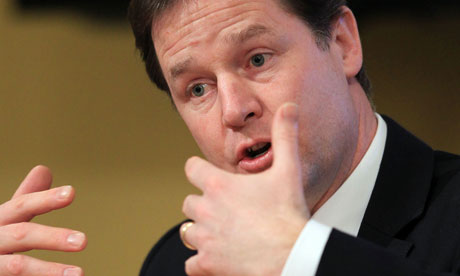JHL human rights defender, Nick Clegg human rights abuser
Nick Clegg backs PM's drive to reform European court of human rights
Deputy PM tells cabinet the coalition is united behind campaign, ahead of David Cameron's speech to Council of Europe
By Nicholas Watt, chief political correspondent
guardian.co.uk, Tuesday 24 January 2012 14.31 GMT
Nick Clegg told the cabinet defenders of human rights wanted to see the court working properly. Photograph: Peter Muhly/AFP/Getty Images
Nick Clegg has told the cabinet he wholeheartedly supports David Cameron's campaign to reform the European court of human rights, as the government dismissed criticism of the prime minister's plans.
In a 15-minute discussion at cabinet on the eve of a speech by Cameron to the Council of Europe in Strasbourg, Clegg said defenders of human rights should support the government as it seeks to tackle a backlog of 160,000 cases at the court.
The prime minister's spokesman said: "It [reform of the court] is very, very clearly the agenda of the coalition government. The deputy prime minister, when he spoke, was keen to make the point that the coalition is united behind this agenda. As he put it, if you are a defender of human rights then you want to see this court working properly."
Clegg was joined in the cabinet discussion by the justice secretary, Kenneth Clarke; the foreign secretary, William Hague; the home secretary, Theresa May; and the attorney general, Dominic Grieve.
The discussion took place after Sir Nicolas Bratza, the British president of the court, criticised "senior British politicians" for pandering to tabloid newspapers over the court.
Cameron, who was angered last week by the court's decision to block the deportation of Abu Qatada to Jordan, is expected to use his speech in Strasbourg on Wednesday to call for a "filtering" system to prevent cases that are dealt with in a proper manner from being referred to the court. British ministers believe that the court should focus its work on member states of the Council of Europe such as Russia and Ukraine with less impressive track records on upholding human rights, rather than the likes of Britain, Germany and France.
In an article in the Independent, Bratza wrote: "It is disappointing to hear senior British politicians lending their voices to criticisms more frequently heard in the popular press, often based on a misunderstanding of the court's role and history, and of the legal issues at stake."
Downing Street dismissed Bratza's criticisms and said Cameron remained committed to reforming the court. Cameron will outline his plans in a speech to the winter session of the parliamentary assembly of the Council of Europe. Britain currently holds the presidency of the council, the 47-member human rights watchdog set up after the second world war which oversees the court. Britain was a founding member.
The prime minister's spokesman said: "We clearly think there is a case for reforming the court. We have explained in the past where we think those reforms should come. If you have a court with a backlog of cases, which is running to 160,000, that in itself suggests there may be some need for reform and some greater prioritisation of cases.
"Clearly there are 47 countries involved here and in order to push through those reforms – we think they are sensible measures – we will have to get those countries to agree to that. That is what we are using our presidency to try and push."
The intervention by Clegg shows that Cameron has been careful to calibrate his reforms. The Liberal Democrats agreed in the coalition agreement to establish a commission to "investigate the creation of a British bill of rights that incorporates and builds on all our obligations under the European convention on human rights". The commission has been carefully balanced to include critics and defenders of the court that enforces the convention.
Comment:
The Prime Minister, David Cameron, is not interested in reform of the ECtHR, rather he seeks to curb its jurisdiction. Therefore for Nick Clegg to support this means he is as guilty as Cameron in relation to being a human rights abuser. Yes, that's right, the leader of the LibDems is a human rights abuser! This was not the case with Paddy Ashdown when he was leader, he was a human rights defender.
I am a Human Rights Defender, whereas Nick Clegg is a human rights abuser. If the government really sought to tackle the backlog of cases at the ECtHR, why has it ignored fully complying with Hirst v UK (No2) thereby sending 3,500 more prisoners cases to the ECtHR?
For the Court to work properly, me as a Human Rights Defender points out to the human rights abusing UK that not complying with the Court's judgments means it cannot work properly. Therefore, the UK needs to pull its weight and stop shirking its obligations under international law.
Sounds like a gathering of the clan or a war cabinet: "Clegg was joined in the cabinet discussion by the justice secretary, Kenneth Clarke; the foreign secretary, William Hague; the home secretary, Theresa May; and the attorney general, Dominic Grieve". All human rights abusers in one room! Damage limitation will not work so why are they wasting their time and taxpayers money trying?
If the UK had dealt with Hirst No2 in a proper manner instead of abdicating responsibility in the first place, my case need not have gone to Strasbourg. Since the UK has a less than impressive track record on human rights protection, the ECtHR is right to rule against the UK.
I want to hear Cameron and Clegg talking about the much needed reforms within the UK. In other words, tidy up your own backyard first!
Nicholas Twat needs to research his subject before putting pen to paper!


No comments:
Post a Comment